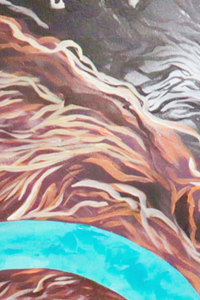Master of Social Work Information
Welcome to the Master of Social Work Program page for current and incoming MSW students. Please read and understand the Essential Requirements for the Master of Social Work (MSW). Please see the Graduate Calendar for an overview of the program, and Graduate Program Regulations
- Two Year MSW Program Course Sequencing
-
Two Year MSW Program (11 credits) Fall Term Year 1
Winter Term Year 1
Summer Term Year 1
SOWK 5000 (0.5 credit) Theoretical Foundations of Social Work: A Critical Perspective *** Mandatory intensive class runs all day Wed through Sat during 1st week of classes in Sept, & one morning in Oct & Nov (see below)
SOWK 5004 (0.5 credit): Group Work Normally offered Fridays 11:30-2:30 No registration is required, unless students wish to take electives if appropriate ones can be found.
Unless you were admitted with part-time status (no funding), you will be charged full-time tuition fees regardless of how many courses you take.SOWK 5001 (1.0 credit) Interpersonal Practice in Social Work: Ethics, Knowledge & Skills. 6 hours class time per week (usually in one day) SOWK 5606 (2.0 credits ) Practicum I
Prerequisites: successful completion of all fall term courses – SOWK 5000, 5001, 5003, 5608.
Students will complete 450 practice hours over the term – approximately 35 hours per week that include at least 12 hours of in class seminars.SOWK 5003 (0.5 credit) Policy Context of Social Work. 3 hours class time per week SOWK 5608 (0.5 credit) Community Practice. 3 hours class time per week
Fall Term Year 2 Winter Term Year 2 Summer Term Year 2 SOWK 5011 (0.5) Social Work & Social Justice *** Mandatory intensive class runs all day Wed through Fri during 1st week of classes in Sept, all day Friday of the second week of Sept, & one morning in Oct & Nov (see below) Elective (0.5) 3 hours class time per week SOWK 5607 Practicum II (2.0)
(Prerequisites: completion of all coursework)
OR
SOWK 5909 – Thesis: begin process before fall term of Year 2. See MSW Thesis Guide at the bottom of this page.SOWK 5012 (0.5) Social Work Research Foundations. 3 hours class time per week. Elective (0.5) 3 hours class time per week Elective (0.5) 3 hours class time per week Elective (0.5) 3 hours class time per week Elective (0.5) 3 hours class time per week Elective (0.5) 3 hours class time per week
- One Year MSW Program Course Sequencing
-
One Year MSW Program (5 credits) Fall Term
Winter Term Summer Term
SOWK 5011 (0.5 credit) Social Work & Social Justice *** Mandatory intensive class runs all day Wed through Fri during 1st week of classes in Sept, all day Fri of the second week of classes, & one morning in Oct & Nov (see below) Elective (0.5) 3 hours class time per week SOWK 5607 Practicum II (2.0)
(Prerequisites: completion of all coursework)
OR
SOWK 5909 Thesis (2.0): begin process before September. Further information and MSW Thesis Guide at the bottom of this page.SOWK 5012 (0.5) Social Work Research Foundations. 3 hours class time per week. Elective (0.5) 3 hours class time per week Elective (0.5) 3 hours class time per week Elective (0.5) 3 hours class time per week
- Fall 2024 Intensive Class Hours (NEW), MSW courses, & Registration
SOWK 5000 & 5011 intensive course hours:
8:30 am – 4:30 pm Wednesday Sept 4, Thursday Sept 5, Friday Sept 6, & Friday, Sept 13
8:30 – 11:30 am Wednesday October 2, & Wednesday, Nov 6****All other MSW courses (5001, 5003, 5608, 5012, and the SOWK 5xxx electives) begin the week of September 9 because MSW students attend their mandatory intensive course during the first week of classes.
The timetable of courses for fall 2024 and winter 2025 will be available at the end of May, and registration will open on July 9.
- Part-Time MSW Students
In their first fall term, part-time students in the MSW Foundation Year (Year I) must register in SOWK 5000 and one of SOWK 5003 or SOWK 5608. In their second fall term, they must register for SOWK 5001.
Part-time students in the MSW Advanced Year (Year II) register in SOWK 5011 and SOWK 5012 in their first fall term.
- Elective Course Requirements
-
The Two Year MSW program (11 credits) requires 3.0 credits (six courses) in elective course options which are taken in Year 2 or once all Year 1 requirements (SOWK 5000, 5001, 5003, 5608, 5004, 5606) are complete.
The One Year MSW program (5.0 credits) requires 2.0 credits (four courses) in electives course options.
All electives must be completed prior to Practicum II (SOWK 5607).
- Graduate Level Electives in Social Work
Graduate level electives in Social Work will vary from year to year depending on instructor availability.
SOWK elective course options may include:
SOWK 5013: Community-Based Participatory Research
SOWK 5014: Social Policy
SOWK 5015: Indigenous Knowledge & Theory for Social Work
SOWK 5016: Social Work Practice with Individuals & Families
SOWK 5017: Advanced Organizational Administration & Practice
SOWK 5018: Advanced Clinical Social Work Practice
SOWK 5020: Social Work in Health Care Settings
SOWK 5021: Advanced Social Work Practice with Groups & Communities
SOWK 5302: Mental Health
SOWK 5700: Special Topics in Social Policy
SOWK 5701: Special Topics in Direct Intervention
SOWK 5702/5703: Special Topics in Social Work
Students can view each year’s elective courses when the timetable is released. View in Carleton Central or the Public Class Schedule
- SOWK Elective Course Registration
The School of Social Work tries to ensure all MSW students have an equal opportunity for a seat in their preferred electives, so we restrict direct registration.
Once registration opens, students will submit “Registration Override Requests” for their required amount of electives in each term.
Students in the second year of the Two Year MSW program will submit override requests for a maximum of two SOWK electives in the fall term, and a maximum of four SOWK electives in the winter term.
Students in the One Year MSW program will submit a maximum of 1 override request for a SOWK elective in the fall term, and a maximum of 3 for the winter term.
Around the middle of July, we review the demand for each elective course, and authorize registrations. An automated email notification is sent to your Carleton email account that a decision has been made on your override request. Once registration permission is granted, make sure you register into the course on the Add/Drop classes page of Carleton Central.For courses where the demand is higher than seat availability, names will be drawn randomly, and those who are unsuccessful will be placed on a waitlist for a seat in the course. Their override request will remain “Pending” and active until the second week of classes each term.
- Graduate Level Electives outside the School of Social Work
-
MSW students may take a maximum of 1.0 credit in non-SOWK courses. This includes courses taken at another university.
Students may opt to take Carleton courses in subjects such as Psychology (PSYC), Sociology (SOCI), Political Science (PSCI), Political Economy (PECO), Women’s and Gender Studies (WGST), Canadian Studies (CDNS), etc. If you find one that you are interested in, you may be blocked from registering for it as each Department controls access to their own courses to ensure their own students get their required courses. Submit a Registration Override Request to request permission from that Department. You also need to send the course outline to the Graduate Supervisor in Social Work requesting permission to take the course as an elective towards your MSW degree requirements. They need to ensure the course meets MSW Learning Outcomes. The course outline may not be available until the beginning of classes, send a course description to the Graduate Supervisor for preliminary approval, and follow-up with the course outline when available.
- Elective Course at the 4th Year Level
-
MSW students are permitted to take a maximum of 0.5 credit at the 4000 level.
If it is a SOWK 4000 level elective, permission from the Graduate Program Supervisor in Social Work is not required. You may find that you are restricted from registering into the course as seats may be reserved for students in the BSW program, so please ensure you submit a Registration Override Request to request registration permission.
If the 4000 level course is non-SOWK, you may need to submit a Registration Override Request from the Department offering the course. Permission of the Social Work Graduate Program Supervisor is also required to authorize use of the course towards MSW degree requirements.
- Directed Study in Social Work: SOWK 5504 (1.0) or SOWK 5506 (0.5)
-
This option normally allows students to develop an individual course of study not addressed through regular courses, by developing their own Directed Studies course. The directed study cannot duplicate an existing course.
There are two types of directed studies at the graduate level:
1. a course developed by student and faculty member and approved for credit by Supervisor of Graduate Studies
2. a 4000 level course with an individualized learning contract with the course instructor to complete it as an MSW level directed study. A directed study organized in this way requires responsibilities and expectations commensurate with graduate level work. Students are expected to attend the scheduled classes for this course. Approval of the Graduate Supervisor is required.Guidelines for both types of directed studies:
1. Directed Studies are not standard practice, but are the exception. They are only possible if a faculty member is able to supervise the study, and if the Directed Study course outline is approved by the Graduate Supervisor.
2. The student and faculty member work in collaboration to develop the course outline
3. Submit outline to the Graduate Supervisor, at least one week before the university registration deadline so that there is adequate time for revisions. Outlines received after this date may not be approved.
4. Send final approved course outline to the Graduate Administrator in order to gain registration access.The course outline for the Directed Study must include:
1. one or two paragraph description of the course objectives;
2. the frequency (6 meetings) and duration of meetings with the faculty member;
3. a list of readings related to the course topic broken down thematically;
4. an outline of assignments or any other work to be completed for the course –the assignment must have a tangible quality, capable of being independently evaluated.
- Independent Research Studies in Social Work: SOWK 5903 (1.0) or SOWK 5904 (0.5)
-
1. Independent Research Studies are not standard practice, but are the exception. They are only possible if a faculty member is able to supervise the study, and if the Independent Research Study course outline is approved by the Graduate Supervisor.
2. Students will need to take the initiative to organize these courses by contacting a faculty member who has a similar area of interest or has expertise in specific areas. Whether a student can complete an independent research project depends on the availability of faculty.
3. If you find a supervisor, send an email to Graduate Administrator requesting the course outline template. Work with the faculty member/supervisor to create the course outline for the independent study. Send the final version to the Graduate Supervisor for approval, before the Graduate Administrator can open a seat in the course.
4. The Independent Research Study should be an original piece of high quality research and must contain a clear theoretical perspective, a sound methodology, and a substantial, analytic information base and a comprehensive bibliography. An independent research study is expected to be approximately 50-70 pages long.
5. The Independent Research Study does not include the formation of a committee, however, a formal proposal must be submitted and approved by both the faculty supervisor, and a second reader. The second reader must be a member of the Graduate Faculty at Carleton University.
6. The research proposal is to be between 15 and 20 pages in length. The supervisor and second reader will either accept the proposal as submitted, accept the proposal with modifications, or will reject the proposal. If the proposal is accepted then the student will proceed to write the independent research study in consultation with the supervisor.
7. The Independent Research Study is graded with a letter grade. The supervisor must receive the final paper in time enough to mark it and send final grade to supervisor within 10 days of the last day of term.Starting the process
Perhaps the most difficult part of writing an independent research study is choosing a topic. This process involves thinking, discussing, writing and rewriting. Students should begin thinking about a topic early in the program. Registering for the Independent Research Study should occur only after extensive discussion with a faculty member who will become the supervisor. Things to consider when choosing an advisor include: her/his knowledge about the subject area and methodological approach appropriate to the topic, compatibility of working style, establishing a schedule of consultation and assistance that is mutually acceptable, and availability of the faculty member.
Preparing the Independent Research Study Proposal
It is essential to have a clearly formulated independent research study proposal of between 15-20 pages. The independent research study proposal will be submitted to a second reader who is a member of the faculty of graduate studies. The second reader will either accept the proposal as submitted, accept the proposal with modifications, or reject the proposal. If the proposal is accepted then the student will proceed to write the independent research study in consultation with the supervisor. The supervisor will submit the final grade to the Graduate Supervisor in Social Work.
Ethics Review
All independent research study proposals involving the use of human subjects must be approved by the Carleton University Ethics Review Committee. Allowing time for this process must be worked into your schedule.
- MSW Thesis Option - SOWK 5909 (replaces of Practicum II)
-
The School of Social Work promotes research as an important component of graduate education. In addition to the work that students prepare for each course, the MSW program offers the option for SOWK 5909 – Thesis in place of SOWK 5607 – Practicum II.
If you are considering a thesis instead of Practicum II (SOWK 5607), please review the MSW Thesis Guide, and MSW Thesis Timeline, before reaching out to potential supervisors before September of the Advanced Year.
If you’re uncertain how to begin, please contact the Graduate Supervisor, and/or Graduate Administrator.
Please note that a thesis usually adds at least one more term of registration with tuition fees. An extension request would be required for each term past your program time limit.Additional Resources:
Thesis Requirements (FGPA)
Thesis Requirements (Regulations of the University Graduate Calendar)
- Graduate Professional Development
-
As a graduate student at Carleton, you have access to a variety of professional development resources. These include skill and writing workshops, one-on-one career and writing consultations, career-oriented events, and even structured programs. Challenge yourself by acquiring new skills that can help you boost your employability. To learn more, visit the Graduate Professional Development website at carleton.ca/gradpd.
Should you have any questions, please contact the Graduate Administrator and/or Graduate Supervisor in Social Work.
Share: Twitter, Facebook
Short URL:
https://carleton.ca/socialwork/?p=777



